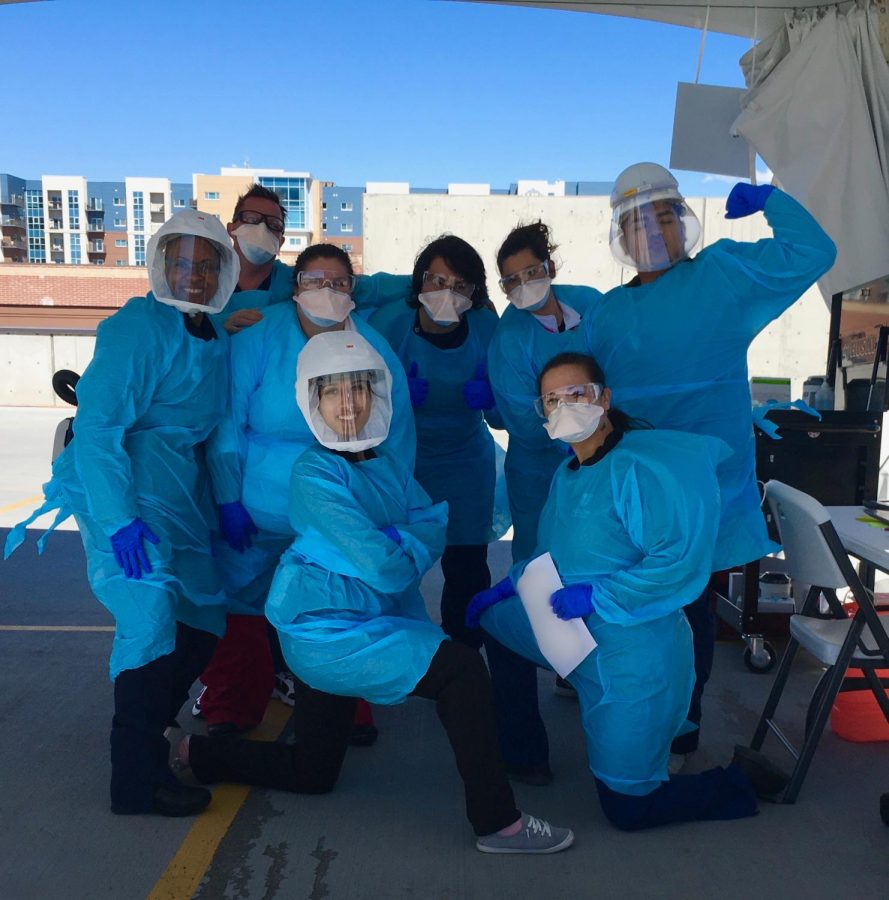Poma: Maintaining Common Courtesy in the Coronavirus Pandemic
The jobs of U students working in health care have changed drastically during the COVID-19 pandemic. (Courtesy Alexis Olivas)
May 22, 2020
During these challenging times, many of us may feel unlike ourselves for one reason or another. One key stressor for all of us is the loss of routine, especially since we can’t know for sure when – or whether – we’ll be able to return to our old patterns. This is a time of widespread uncertainty, and as such, stress lingers no matter where we go. As horrible as that anxiety is in and of itself, the problem worsens when people begin to take their anger out on employees and fellow community members. Even this pandemic does not warrant unkind or unsafe behavior.
A few days ago, I went to Trader Joe’s. As of now, customers there are required to stand back while the cashiers scan and bag their items before going up to pay at the counter. Like most stores, Trader Joe’s now has plastic screens at each counter to further reduce contact between employees and customers. As I waited in line, a woman a few registers down asked why she needed to stay back. The cashier explained that these were simply social distancing precautions to keep her, other customers and the employees safe. Instead of complying, the woman loudly berated the cashier, complaining that it was “stupid” and that she shouldn’t have to take these additional steps when everyone in the store was already wearing masks.
I felt uncomfortable seeing the interaction unfold, but I understood where the woman was coming from. It can be frustrating when every store we go to suddenly has limited capacity, and it’s sometimes exhausting to bend over backward to meet social distancing standards. But frontline workers, like the Trader Joe’s cashier, are just doing their jobs. Like all of us, they’re experiencing absurd amounts of stress from the new risks associated with coming into close contact with people at work, busier hours and so on — not to mention dealing with difficult customers. They — at the very least — deserve our compassion and respect, no matter how stressed we might be. And, just as importantly, we should keep in mind that these regulations are designed to prevent further spread of the coronavirus. They’re designed to serve a legitimate purpose, not to make our lives unnecessarily difficult.
It’s worth noting that social distancing is now a part of demonstrating that courtesy — it’s not enough just to be friendly to frontline workers. Being respectful to others in this pandemic includes being aware of our surroundings and doing our part to help. For instance, it’s important to properly distance ourselves not just by staying home as much as possible, but also when we enter public spaces for our necessities. As experts have recommended time and time again, we should all take extra care to wash our hands, wear a mask and keep a six-foot distance from others. These small behavioral changes are part of being thoughtful, courteous members of our community as we navigate this crisis together. And remember, the fact that you might not believe that social distancing works doesn’t give you the right to ignore regulations since doing so puts others’ peace of mind at risk as well as their health.
Along with social distancing practices, it’s equally important to care for our mental health to avoid spreading unnecessary stress in this already upsetting time. It can be difficult to destress, especially right now. Even as Utah begins to transition to moderate risk practices, our lives still can’t go back to normal. Regular relaxation methods like playing group sports, going for a drink or shopping are not currently possible. But instead of lashing out or complaining about the way things are, ask yourself how you can improve your own behaviors so you don’t transmit those unhealthy attitudes to others.
The CDC, WHO and countless other sources emphasize that taking care of our mental health during this pandemic is crucial. And it’s fairly easy to implement some techniques into our daily lives. Something as simple as taking a break from social media and the 24-hour news cycle can significantly reduce stress. It also helps to move around while at home. Take a walk around the block while maintaining distance from others. Find an at-home workout routine that keeps you motivated. Even picking up a hobby to focus on something other than the turbulent world we live in can help immensely. A more positive mindset as a whole will put you in a better mood, which can influence others’ attitudes for the better.
It’s okay to have negative emotions during COVID-19. But it’s not helpful or fair to spread that stress by disrespecting others or being unkind. Taking the time to care for ourselves and each other is one of few ways to achieve normalcy and positivity right now. As we make small changes to help and protect one another, we can continue to stay safe and positive over the course of this pandemic.
Editor’s note: Signs and symptoms of COVID-19 include fever, dry cough, tiredness and shortness of breath. These symptoms are believed to occur between two and 14 days after a person is exposed to the disease. If you have these symptoms and have recently come into contact with a person who is known to have COVID-19, or if you have recently traveled to an area with community spread of the disease, you should call your doctor. Areas with community spread of COVID-19 are believed to include China, South Korea, Italy, Iran and Seattle. If you do not have a doctor who you visit regularly, please call the Utah Coronavirus Information Line at 1-800-456-7707 or the University of Utah Health hotline at 801-587-0712. Do not go to a healthcare facility without first making arrangements to do so.








